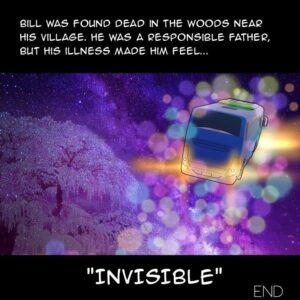But what he said next would unravel everything they thought they knew about their lives — and each other.
His mother, Lydia Ward, froze mid-step.
His father, Daniel, lowered the newspaper and blinked.
“What did you just say?” Lydia asked cautiously.
Ethan looked up with an unsettling calmness, his blue eyes steady.
“My real mom wore a blue dress,” he said. “She fell into the well in our garden. Daddy Daniel was there.”
The room fell into a silence so thick that Lydia could hear the ticking of the old kitchen clock.
A Perfect Family on the Surface
Lydia and Daniel Ward had adopted Ethan two years earlier.
He had been found abandoned on the steps of a small-town church, wrapped in a hospital blanket, with no note and no trace of his biological parents.
They’d been told he was lucky — healthy, bright, and sweet-tempered.
“He hardly ever cried,” Lydia once told neighbors. “Just… watched everything.”
Their farmhouse sat on three acres of green hills outside of Bend.
Behind the property, overgrown with ivy, was an old, sealed stone well that dated back to the 1940s.
It had long been covered with a heavy metal grate and forgotten.
Until that day.
The Day Everything Changed
After Ethan’s statement, Lydia tried to laugh it off.
A Nurse Mocked a Pregnant Woman and Even Called the Police — But 15 Minutes Later, Her Husband Walked In and Everything Changed Isabelle Laurent, 29- year-old—seven months pregnant, she had rushed in
“Honey, what well are you talking about?” she asked.
“The one by the apple tree,” Ethan said, pointing toward the back window. “The one Daddy closed.”
Daniel’s face went pale.
“Lydia, he’s just making things up,” he muttered, forcing a smile. “You know how kids are.”
But something in his tone made Lydia’s stomach twist.
That night, she couldn’t sleep.
Ethan’s words echoed in her mind: She fell into the well… Daddy Daniel was there.
At 2 a.m., she got out of bed, grabbed a flashlight, and walked barefoot through the dewy grass toward the apple tree.
The beam landed on the rusted metal grate — and on something else.
Scratches.
Fresh scratches, jagged and raw, like fingernail marks.
The Investigation Begins
The next morning, Lydia called the police.
She told them everything: the child’s words, the well, the scratches.
Two officers arrived by noon. They asked questions politely but skeptically.
When they pried open the old grate, a wave of foul air rose up, and their expressions changed instantly.
Beneath the first few feet of water, they saw something — a pale fabric, tangled in debris.
The county’s search and rescue team was summoned. Within hours, they pulled out what appeared to be human remains wrapped in a faded blue dress.
The discovery sent shockwaves through the small community.
And that same evening, Daniel Ward was taken into custody.
Daniel’s Story
According to court records, Daniel claimed complete innocence.
He insisted he’d never known the well was open, never seen the woman, and had no idea how Ethan — or anyone — could know what was down there.
But investigators soon discovered something that made national headlines:
fifteen years earlier, Daniel had lived on the same property with his first wife — a woman named Claire Bennett — who had gone missing without a trace.
At the time, her disappearance was ruled accidental.
She’d been reported as having “emotional difficulties,” and police believed she had simply walked away from her life.
Daniel sold the property a year later, remarried, and eventually adopted Ethan with Lydia.
But now, forensic testing confirmed what no one wanted to believe:
The body in the well was Claire.
And her cause of death?
Blunt force trauma to the skull.
“He Was There…”
When detectives questioned Ethan again, they were careful not to lead him.
Yet the boy’s descriptions grew eerily precise.
He spoke of “the night with no moon.”
Of “Daddy pushing Mommy after the loud fight.”
Of “the sound of water and crying.”
He described the blue dress — and the necklace Claire’s sister later confirmed she had been wearing the night she vanished.
But the most chilling part was what he said next:
“I was there before. I had to come back to tell.”
Psychologists called it a memory reconstruction — possibly the result of overheard conversations or trauma imprinting.
Others whispered about reincarnation.
Either way, the details matched too perfectly to ignore.
The Trial
Daniel Ward’s trial lasted eight weeks.
Prosecutors built their case around forensic evidence: traces of Claire’s blood on old tools in the barn, inconsistencies in Daniel’s timeline, and witness accounts of their frequent arguments.
Ethan was not called to testify — he was too young — but his statement was entered into the record as part of the discovery process.
When the verdict came — guilty of second-degree murder — Lydia sat in the courtroom clutching Ethan’s small hand.
Daniel turned toward them briefly, eyes hollow.
He said nothing.
He was sentenced to life imprisonment without parole.
The Mystery of the Child
To this day, experts remain baffled by Ethan’s knowledge.
No one had ever told him about the well.
No photos of Claire existed in the house.
The adoption agency confirmed that his records contained no connection to the Wards or the property.
Lydia moved away shortly after the trial, settling in northern Washington under a new name.
In interviews, she rarely spoke of her husband — only of Ethan.
“He doesn’t talk about it anymore,” she once told a journalist. “But sometimes he draws wells. Always with a woman in blue, smiling. He says she’s not sad anymore.”
Theories and Questions
Parapsychologists flocked to the story, calling it one of the most compelling “memory transfer” cases ever documented.
Skeptics argued it was coincidence, or perhaps that Daniel — wracked by guilt — had unconsciously revealed details in his sleep that the boy picked up on.
Still, others saw something beyond explanation.
A detective who worked the case summarized it simply:
“There are things you can’t explain with science. A child told us what we’d buried for fifteen years.”
Epilogue
Today, Ethan is eleven.
He lives a quiet life with his mother in a lakeside town.
He loves drawing, reading, and building birdhouses.
But every year, when spring comes — around the same time the well was opened — Lydia notices a change.
He becomes distant, restless, as if listening for something far away.
Once, when she asked him what was wrong, he just smiled faintly and said:
“She’s watching us from the garden.”
And for a moment, Lydia swore she could smell wildflowers and damp earth — the faint scent of a life reclaimed from silence.




